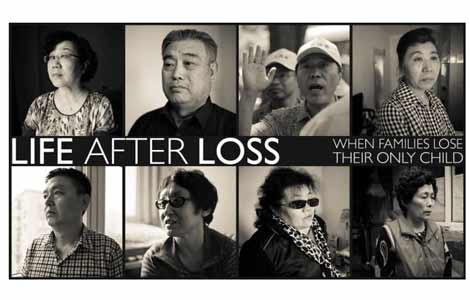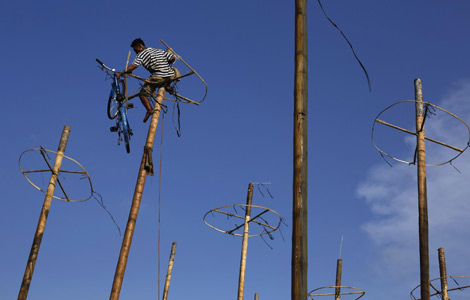The homeless reveal loose ends of China's urbanization
Updated: 2013-10-03 14:10
(Xinhua)
|
|||||||||||
FORLORN AND UNATTENDED
Many homeless at the railway station come from broken families and have not been covered by any social security programs. They have no savings to tide them over when old age or disease prevent them from employment.
Zhou Lianjia, a 69-year-old scavenger at the station, was left with no income or pension when his two sons sold his village house 20 years ago but refused to provide for him.
The farmer from Hebei has roamed in several cities, including Beijing, fending for himself by scavenging. But his old age and worsening health have taken their toll recently. He has only been able to earn one yuan per day by collecting bottles and has survived by eating others' leftovers.
"I wish to go home, but I don't know if my children are willing to provide for me," he said.
Liu Huaide, who was found at a filthy, fetid corner behind the station's notice board, is a reminder that bad luck can also wreak havoc on urban poor who are unprotected by the social safety net.
The 55-year-old man, suffering a tumor in his throat, could only murmur vague details about his life. His swollen hands cannot move and his legs ache with arthritis when walking.
The former lathe operator at a State-owned factory in Liaoning province was laid off after a cerebral thrombosis made him too sick to work. He visited Beijing for better treatment in 2009, but the hefty medical bills dried up his savings in just a few months.
The man ended up on the street, having no relatives to turn to.
"I miss Liaoning. I miss my home, but I'm afraid I could never return home in this life," he said.
SEEKING HELPING HANDS
According to a Ministry of Civil Affairs report, China provided about 2.77 million times of aids to urban homeless and beggars in 2012. But experts said many homeless were still beyond the reach of official aid.
Zhou and many other homeless said they have never been approached by the city's homeless shelters, and some remain skeptical about the facilities.
"Perhaps the government can't take all the people like me into care because there are so many. Besides, the facility can't offer medical treatment, so it's pointless for me to go there," Zhou said.
Wang Changlun, director of the administrative authority of the city's homeless shelters, said Beijing has established institutions in every district and county to provide board and lodging for the homeless.
However, the homeless can only receive aid for up to ten days and will be persuaded to leave the city and return to their hometowns, Wang said, citing a State Council guideline on aid for urban homeless and beggars.
"There are indeed some homeless who resent our aid. They make a living by begging and don't want to be sent back to their rural homes," Wang said.
But despite the lack of access to sustainable government aid, the homeless at the station said they nevertheless have been supported by the city's many "kind-hearted people."
Some strangers routinely visit the station's square to deliver food to the homeless, and sympathetic local business owners give them goods and services free of charge, according to Zhou and Yan.
As Xinhua reporters followed Xiaoxiao as the boy searched for bottles, a man on a scooter tucked over a dozen yuan into his hand and left without a word.
"I know him. He often gives us money, but we don't know his name," Xiaoxiao said.
Liu Ming, a laid-off taxi driver, routinely sends food to Lei Kuidian, a 92-year-old veteran soldier who begs outside the railway station.
The old man refused to make any criticism against the government. He said he was satisfied with his current life, but cried when a man robbed him of his coin pot last year. A young stall owner chased half a block to retrieve the pot for him.
Find more in
Related Stories
Conference focuses on new energy, green economy 2013-09-27 08:44
Technology and the new urban China 2013-09-27 07:07
China to boost urban infrastructure 2013-09-17 09:03
Farsighted urban planning 2013-09-18 07:49
Migrants in urbanization 2013-09-12 07:34
Today's Top News
A community of common destiny with ASEAN
Shutdown still in deadlock after talks
UNSC urges boost to Syria aid access
Russian embassy in Tripoli attacked
Iran has proposal for nuclear deal
Xi opens up on hopes for football World Cup glory
Trending news across China
President Xi meets Indonesian counterpart on ties
Hot Topics
Lunar probe , China growth forecasts, Emission rules get tougher, China seen through 'colored lens', International board,
Editor's Picks

|

|

|

|

|

|






